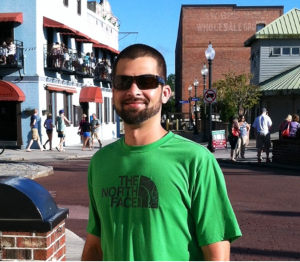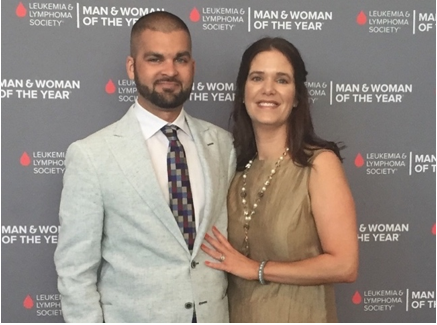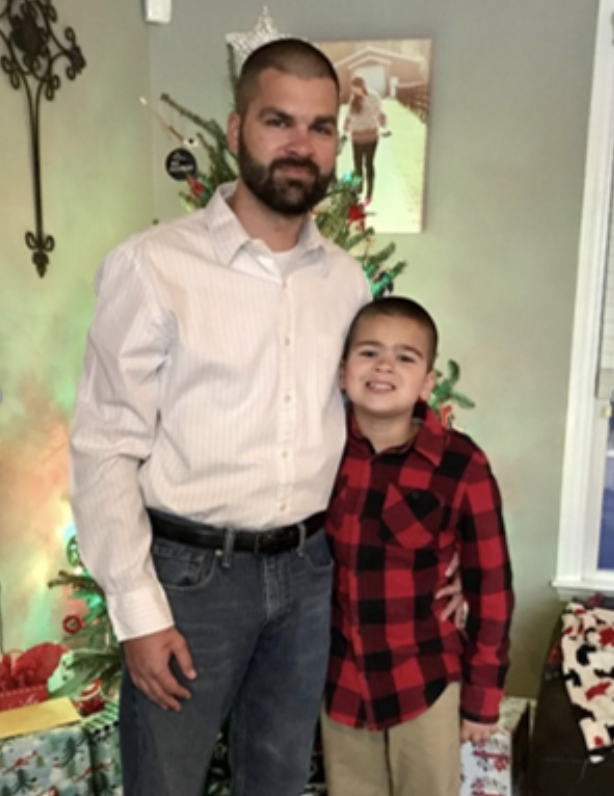Andrew, an astrocytoma survivor, visits the Neuro-Oncology Branch regularly for treatment advice from our experienced neuro-oncology physicians and nurses.
By Andrew, Astrocytoma Survivor
June 19, 2020
Before I was diagnosed with a tumor on my brainstem in 2017, I had a really good life. I was married to my high school sweetheart with two beautiful kids and a job I loved.
My symptoms started with some numbness on the right side of my face and very mild headaches that never completely went away. Because I was working over 50 hours a week with a long commute each day, my primary care doctor kept suggesting it was just stress. Ironically, I was the least stressed I had ever been in life. I loved my job as a controller, I was working out regularly, and my family life was great.
The doctor still prescribed me anxiety medications for the pain, which I decided to try, hoping they would help. Weeks passed and the headaches were still present. My wife, being a nurse, suggested that something might really be wrong. Things changed so fast after that.
Inoperable Tumor Diagnosis
My primary care doctor scheduled an appointment with a neurology clinic close by. I still remember that day like it was yesterday. After hours of waiting, the doctors finally told me they located something on my scan and that I should visit the nearest emergency room—or I may “die at any moment.”
Overnight, my wife assembled the best team of physicians through her hospital connections where she worked, and I was admitted to the emergency room the next morning. I had a biopsy on the tumor two days later, and results showed that it was a grade 3 astrocytoma. After spending a couple more days in the intensive care unit, I was allowed to go back home. It was crazy to think that, within a week, my whole life had changed.
I was pretty serious about continuing my job because I enjoyed it so much, so I started working from home. This really helped me get through the first couple months, and I received a ton of support from my supervisor, colleagues, and, of course, my family.
Since my tumor was on my brainstem and surgery posed too many risks, it was considered inoperable. Instead, the doctors suggested high-dose radiation and chemotherapy for a few weeks. Following this treatment regimen, a magnetic resonance imaging (MRI) scan showed potential growth. I decided at that moment that, if I was going to get better, now was the time to be as aggressive as possible.
Discovering Clinical Trials
Thankfully, there was a local clinical trial I could enroll in to test if a new drug would give me a better outcome. While this new treatment gave us hope, I started feeling physically ill for the first time since the diagnosis as I took the drug over the next few weeks. Eventually, I couldn’t work from home anymore because of how tired I was.
Scans after the first round of treatment showed no improvement in the tumor size—everything had remained exactly the same. We decided to take a break so I could recover for a while. I did remain on chemotherapy, but at a low dosage because of my white blood cell counts.
All this time, my wife and I had been asking each other, “Where do we go if things get really bad?” We researched options for clinical trials around the country. We came across the NCI Center for Cancer Research's Neuro-Oncology Branch (NOB) at NIH soon after. We discovered that there was a trial for IDH-mutated brain tumors just like mine, so we decided to visit NIH for a consultation.
While we have been to NIH every two months for almost a year now to monitor my disease, I haven’t participated in any clinical trials just yet. My scans in winter 2019 showed stable disease, and we are following the recommendations of our NOB care team to only intervene when the scans show tumor growth. I will decide at that point if I wanted to be part of a clinical trial.
The support we have received from NCI through this process has been absolutely phenomenal. The doctors have been so amazing at providing hope and spending time answering our questions. I’m also very thankful that they work closely with my care team at home to make decisions that are best for me and my family.
Impact on My Life
Life has been a roller coaster since my astrocytoma diagnosis, and I would have never thought I would be where I am now. In the spring of 2019, when I couldn’t continue working anymore, I decided to become a stay-at-home dad and realized how much time I was missing with my kids. I couldn’t even attend their school events before, and I now get to pack their lunch, take them to school, go on field trips, and spend quality time with them.
The biggest lesson I’ve learned from this is that everyone reacts to drastic life changes very differently. When I was first diagnosed and the doctor told me I could die any minute, it felt as if I was always counting the days until things took a bad turn. I did spend a lot of time being sad and emotional, but there came a point when I had to accept this as my new reality.
I began focusing on the things I could do that particular day to take care of myself and those around me. I became more conscious of what I put into my body, changed my diet, and drank more water. I also tried yoga for the first time as well as meditation, which really helped me find my Zen.
Over time, I have learned that it is never a situation that matters, but rather how I react to it. I didn’t have control over my disease or the situations around me, which changed every day. But I now know that how I feel today doesn’t have to dictate how I feel tomorrow, in a week, in a month, or even in a year from now.
Impact on My Family
This disease not only affects me, but my family as well. Our family dynamics have changed a lot since my diagnosis. Early on, we weren’t fully aware of the caregiver aspect of the situation, and my wife often felt her worries and anxieties were pushed to the side because the focus was always on helping me get better. Over time, we have all learned to take care of each other through this. My kids, especially my older son, are very in tune with my condition. He has a counselor to talk to and resources he can use when he feels sad and can always come to us for help as well. We have been open and honest with him and are now doing the same with our younger daughter.
It’s so important to find peace within yourself and be optimistic about life. That was one of my goals when I started this journey, and I’m so thankful I’ve found a way to my serenity, because it makes my recovery process so much easier. Science can tell you many things, but it’s how you live your life and finding happiness every day that matters the most.


